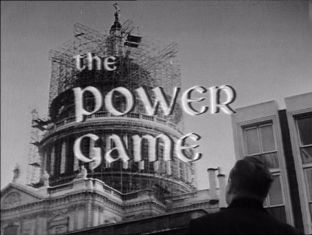

”Special Envoy: Cat is You, Bird is Me” Writer Peter Draper Director Robert Tronson.
“ Much as I disapprove of Wilder – O, There Are Times When I Could Wish I Were He!” .Jason Fowler
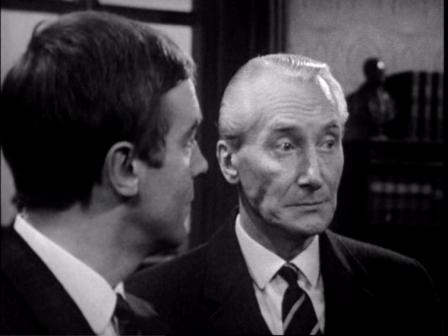
Wilder is interviewing interpreters to accompany him to a meeting about the Common Market in Bonn. Jason Fowler (Richard Hurndall) urges him to meet Herr Wisselman (Jeffrey Segal) who is due to speak at a world bank seminar in Geneva. Fowler thinks Wisselman could change the whole concept of modern finance. Wilder is unenthusiastic about a side trip to Switzerland until he meets 20 year old interpreter Perpetua Cataline (Felicity Gibson) and hears her views on the hedonistic life-style. Wilder decides to drive with Perpetua to Geneva, while Don Henderson (Jack Watling) is sent ahead to make contact with Wisselman.
Left behind in England, Lincoln Dowling (Michael Jayston) takes Lady Wilder (Barbara Murray) boating, but soon finds he needs all his ingenuity to protect her reputation.
“Lincoln, you’re a bloody fool,” Pamela Wilder tells Dowling when he refuses to believe she’s content in her marriage. “I’m sure I’m not the only one,” he replies, as the scene cuts to John Wilder, desperately gyrating on the dance floor of a discotheque with a 20 year old girl.
As if to hammer the point home, an earlier scene has shown Wilder in the back of his Departmental Rolls Royce, sipping champagne with the girl as the Beatles’ ‘Fool On The Hill Plays over the radio.
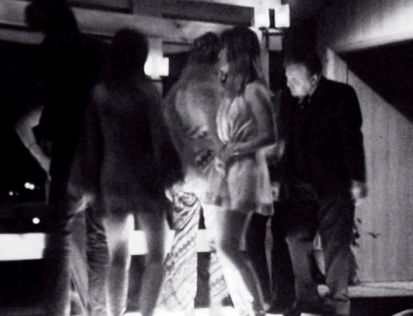
With spectacular irony, after telling Helen Ferguson in “The Big Nothing” that he can’t afford the time for an affair, and testing the patience of the audience in the previous two episodes trying to defend himself from the accusation of adultery, Wilder now falls hook, line and sinker for Perpetua Cataline (Felicity Gibson).

Patrick Wymark is in full Sid James mode from the moment the mini-skirted Felicity Gibson strides into his office. Carefree and confident as only the youngest daughter of the Earl of Wessex could be, Perpetua quickly charms Wilder with her observation of “people who go about their jobs as if they’re in prison. They seem to think their good time is coming when they retire. But they forget they’re going to be so OLD! It’s like being good all your life because you’ll get your reward in heaven. If there’s no heaven – you’ve been swindled!”

Perpetua is summarised by Armaton (David Gooderson), a fey confidant of Lincoln Dowling’s as, “Cheltenham Ladies college – brief but startling term in Zurich – Sussex University; Grosvenor Square Riots. Reads Queen, Nova and the Black Dwarf. Smokes pot, takes the pill, intends refusing to vote – and the Kings Road passes straight through her flat. In short, the product Emily Pankhurst gave her entire life to allow its head.”
Jason Fowler later admits that he was tired of Wilder rejecting all the interpreters sent to him. While he hoped Perpetua would sweeten the prospect of Geneva, he also hoped that, “the sight of her mini-skirted thighs might bring him out in a hot sweat.” But Fowler wrongly assumed Dowling would be accompanying Wilder on the trip as a moderating influence and “her inaccessibility would drive him mad.” Fowler has underestimated Wilder’s practiced adulterousness. No sooner has Perpetua boasted, “I’m on the pill!” than Wilder is cancelling Dowling’s ticket. “I might need to deal with this in a quite unorthodox way and I don’t want the full might of the Foreign Office breathing down my neck. I shall take Don with me.” And then as soon as Dowling is out of the office, Wilder admits that he will be driving down to Switzerland in the back seat of the Rolls with the interpreter while Don flies on ahead.
Wilder’s initial seduction technique – connecting rooms in a St Moritz hotel, candlelit champagne dinner served in their suite by waiters, Wilder in smoking jacket and cravat – falls flat when Perpetua asks, “Did you see a lot of Ronald Colman movies when you were young?”
Abandoning their suite for mod dancing in the restaurant downstairs, Wilder is gradually won over. Perpetua observes that everything about Wilder is neat as if he thought he could tidy up life. “Shall I tell you how to do the dances today?You do them how you want to do them! Just let yourself go. The thing about dancing nowadays is that if you’re enjoying it, you’re doing it right!”
When Wilder confesses that he doesn’t even understand the language, Perpetua translates that, “Cat is you, bird is me” and Wilder asks wistfully , “Will this cat get the bird?” Finally he wins her over by reciting from Andrew Marvell’s “To His Coy Mistress” and “The Definition of Love”. She concludes that, “Underneath the neat shirt there’s a poet.” And tells him it’s time for bed.

By contrast, Pamela Wilder remains steadfastly virtuous when Lincoln Dowling invites her to join him for a weekend’s sailing. When he assures her that, “No-one will have to know” Pamela replies that, “I don’t think I want to do things anymore that people don’t have to know about.” She tells him about her affair with Frank Hagadan and rationalises that, “It was because of John really. I think I said to myself – if he can do so-and-so, I can do such-and-such. It wasn’t much of an affair really. There was never a chance of my going away with him. I wasn’t prepared to give up what I’d got.”
Pamela agrees to join Dowling sailing down to his friends house in Salcombe, but a storm forces them to seek haven 20 miles short of their destination in Brixham. Dowling and Pamela spend a chaste night together, and she resists his attempt to kiss her. The next morning, as they prepare to catch a train back to London, they are confronted by a journalist acquaintance of the Wilder’s. As she begins to probe about the boat, Dowling tells her they were accompanied on the boat by his Aunt May, “She’s Sixty Nine – unbelievably good at splicing ropes - and spiking guns,”
While Pamela professes to believe that Wilder has changed, Dowling refuses to capitalise on his knowledge. On the train back to London, Pamela asks who John has travelled to Switzerland with. Dowling bluffs that he doesn’t know and Pamela utters a cryptic “good for you.” A cynic might say that as Wilder’s assistant, Dowling would be expected to know who was travelling with him, and his refusal to say consciously confirms Pamela’s suspicions. A romantic would say that Dowling is merely refusing to lie, without actively betraying Wilder.
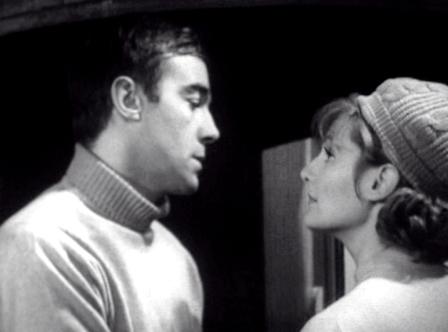
Jack Watling has a slightly more substantial role as Don Henderson in this episode. Just like old times, he’s the much put-upon leg-man for Wilder, flying ahead to track down the elusive Swiss banker Wisselman. But he also serves as a comic foil to Wilder, warning him that he’s “overdrawn at the fun bank.” When Wilder asks, “If you saw me in a bar with that girl and I said I was 49, what would you think?” Henderson replies, “Oh come now, John. 49’s young – for a dirty old man!”
Once again, this series of “The Power Game” harks back to the past with an episode which is reminiscent of John Gray’s “Plane Makers” episode, “Appointment In Brussels”. In that episode Sir Gordon Revidge imposes Laura Challis on Wilder because he wants to know why Wilder is meeting Pierre Dagenais. Here, Jason Fowler sends Perpetua Cataline as interpreter because he wants Wilder to agree to meet Herr Wisselman. In the “Plane Makers” episode, Wilder and Challis are forced by fog to spend the night in a hotel, while here it is very much part of Wilder’s plan. In both episodes, Wilder initially offers Pamela Wilder the chance to accompany him abroad and cruelly withdraws it when he knows who his travelling companion will be.
With Lord Bligh mysteriously “away” (and disposed of in a couple of lines of dialogue), it is Jason Fowler who sets the plot moving by asking Wilder if he’d like to “meet a Swiss banker who wanted to undermine the whole concept of modern finance.”.
As noted in the introduction, this episode was made at a time when the system of fixed exchange rates agreed at Bretton Woods in 1944 was coming under increasing pressure. Under the Bretton Woods agreement, the International Monetary Fund managed a system in which each country set an exchange rate for its own currency relative to an ounce of gold valued at 35 US dollars. While the system had produced stability for 20 years, it was an “adjustable peg” system which allowed members to adjust their exchange rate.
A financial crisis in 1967 had seen the UK pound devalued by 14% and while the international system held, the resultant price rises and cuts in imports produced a sombre mood within Britain. Other nations, with conflicting aims, began to exploit the relief mechanism by which central banks could exchange their dollar holdings for gold bullion; France demanded to “cash in” its gold from the New York Federal Reserve. With the Bretton Woods system struggling to service rapidly expanding world trade, an alternative was needed .
Script Editor Wilfred Greatorex had a journalist’s background and made great use of technical advisors as a basis for his lengthy script conferences. It’s likely that some of the theories put forward in this episode reflect genuine speculation from 1969.

Fowler explains that Herr Wisselman has published an article which takes as its starting point the fact that South Africa and Russia control 30% of the world’s free gold. Fowler enthusiastically endorses the proposition that the world will divide into two power blocs – white and non-white –with South Africa “together with its gold taken over by the non-white bloc. If the coloured races align with communist China, Russia and its gold would be drawn into the non-white bloc.
Fowler is therefore endorsing a paranoid view of Britain and Europe aligned with North America and Australia/New Zealand against the rest of the world.
“Herr Wisselman made the point that unless we move away from gold in the next 50 years, we could be subject to intolerable blackmail.” The banker has suggested a system of “paper gold” (which is the name often given to the “Special Drawing Rights” actually created by the International Monetary Fund later in 1969). Fowler says Wisselman has come up with some “original and unorthodox thinking.” A lot of people want to silence him because he threatens the established order, but Fowler thinks Wilder could persuade him to make his theories public and drive other countries to make their economic plans clear.
When Henderson finally forces Wilder to halt his pursuit of Perpetua long enough to meet Wisselman (Jeffrey Segal) the banker explains that his article was written for a Swiss satirical magazine. “The two nation’s hypothesis and the idea of paper gold…was an amusing idea. It’s not even wholly true. Gold is fairly evenly distributed over the whole world.” Wisselman says he thinks they’re the only ones who have taken his article seriously. When Wilder says he got it from Jason Fowler, Herr Wisselman remembers their meeting. “He struck me as a man who needed an idea – perhaps because for years an idea has been expected of him and he has never been able to deliver.” So Fowler emerges as the third fool of the episode.
However, there is one more fool to come. Learning that Wilder has ambassador status and thinking this gives him customs immunity, Perpetua has gone on a shopping spree. They return by the new Seaspeed Hovercraft to Dover where Wilder tries to claim diplomatic immunity at the Customs post. Patrick Wymark signals an underlying unease when he tries to pull the "do you know who I am" routine, and the unease is justified. After the Surveyor (Anthony Brown) insists that Wilder and Perpetua get out of the Rolls and submit to a search, Wilder phones Don to get hold of Fowler. Unfortunately, Fowler confirms that Wilder does not have diplomatic immunity. “He’s not actually accredited – not to any country.” A furious Wilder returns to find a rummage crew taking the Rolls apart. When one of the Waterguard officers (Clyde Pollitt) confirms that they haven’t found anything except the pile of expensive shopping in the boot, which needs the duty paying.
”I could have told you that,” Wilder replies “If this is the gateway to England, the country would be far better off if they put you back in your laboratory jar in which you obviously spent half your life”
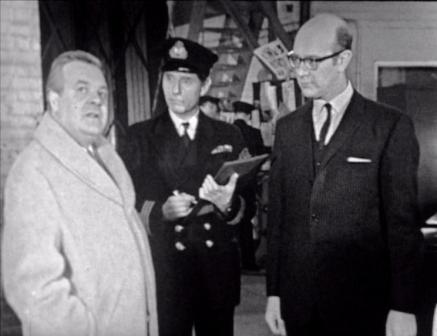
“We get a great many diplomats through here, Sir John,” the Surveyor replies, “If they all paid their duty, perhaps the country could afford the formaldehyde.”
As a parting shot they tell Wilder that, “Although we have the right to take the car apart if we think it necessary, it is not incumbent on us to put it together again.”
Furious, Wilder tells Perpetua to pay the duty on her shopping and also orders his driver to give her a screwdriver to help put the car back together again.
The pointed use of the Beatles 1967 song “Fool On The Hill” is one of the few examples in 1960’s TV of a pop song being used to comment on the action (now of course it is done to death at length in almost every soap opera and drama show). The song was recorded for Magical Mystery Tour, which is also appropriate given Wilder’s flight of fancy in the back seat of a Rolls. Patrick Wymark was often cast as fools at the Royal Shakespeare Company (although not so often as legend would have it).
While Wilder and Perpetua are talking in the discotheque, the background music is a mod electric organ piece used in the 1968 Central Office of Information film for “Keep Britain Tidy”featuring Roy Hudd as a litterbug.
Perpetua’s reading matter described by Armaston includes Black Dwarf, a short-lived radical newspaper published from May 1968, Queen a “Chelsea Set” society magazine ironically associated with the birth of “pirate radio” and Nova, a cutting-edge woman’s magazine supposely read by more men than women..
Dowling’s gossipy colleague Armaston gives the impression of being a discretely gay character. He says he’s learned about Wilder and Perpetua from “a depraved adolescent in a discotheque” and when Dowling asks what affairs he’s devoting himself to, Armaston gives a sly sideward glance, “My dear, if I could only speak.”. Armaston is played by David Gooderson, who played Davros in “Doctor Who” and Simpkins the pathologist in “A Touch Of Frost”.
22 year old Felicity Gibson (Perpetua) had previously appeared as Kando in the 1968 Patrick Troughton “Doctor Who” story “The Dominators”. She would later appear with Barbara Murray in “The Duchess of Wiltshire’s Diamonds”, an episode of “The Rivals of Sherlock Holmes” starring Roy Dotrice as Klimo. Although Clifford Evans is absent from this episode, he would star in John MacKenzie’s 1971 film “One Brief Summer” (“A young wife who didn’t love him enough, a daughter who loved him too much”), which earned Felicity Gibson an “introducing” credit.
Robert Tronson would cast Anthony Brown as a customs officer once more in an episode of Wilfred Greatorex’s “Hine” and he would also appear as Alec McCowen’s superior in 1983 play “The Traitor” which served as a pilot for McCowen’s “Mr Palfrey of Westminster”.As noted above, while the paranoid racial scenario endorsed by Fowler has not come into play, the Bretton Woods system was threatened by speculators and other self-interests exploiting gold's status as a commodity with a rising value. “Paper Gold” - was introduced by the International Monetary Fund in 1969 in the form of “Special Drawing Rights” that had no value other than as a medium of exchange for member currencies.It was never a lasting solution and in 1971 the United States abandoned dollar convertability to gold. In 1973 the world moved to floating exchange rates.